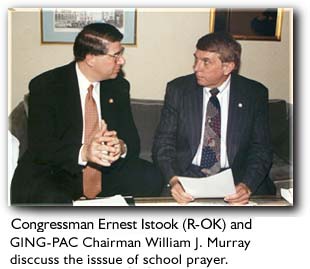

|

Congressman Istook Introduces
Religous Liberties Amendment to U.S. Constitution
11/21/95 News Release; Contact:
Kristy Khachigian, (202) 225-2132
Washington D.C. --
Congressman Ernest Istook (R-OK) and over 100 other members of
Congress announced introduction today of a
constitutional amendment to protect religious liberties. It
would allow student-sponsored prayer in public schools, but not
government-composed prayer or compulsory prayer. It would also
protect acknowledgments of religious heritage, beliefs, or
traditions of the American people, and forbid discrimination against
religious expression or belief. The amendment has 88 orgiinal
co-sponsors. GING-PAC Chairman William J. Murray was present with
Congressman Istook for the introduction.
 "Our explicit First
Amendment guarantees of freedom of speech and of freedom of religion
and of religious epression have been subordinated to a new notion --
one not found in our Constitution," declared Istook. "We
are being told that freedom of religion takes a back seat and must
be restricted whenever anybody complains that it makes them
uncomforable. Those who choose to be intolerant of religion are
permitted to control and restrict the behavior of those who simply
wish to express their belief, as the Constitution is meant to
guarantee. "Our explicit First
Amendment guarantees of freedom of speech and of freedom of religion
and of religious epression have been subordinated to a new notion --
one not found in our Constitution," declared Istook. "We
are being told that freedom of religion takes a back seat and must
be restricted whenever anybody complains that it makes them
uncomforable. Those who choose to be intolerant of religion are
permitted to control and restrict the behavior of those who simply
wish to express their belief, as the Constitution is meant to
guarantee.
"As we approach Thanksgiving,
Americans express thanks, including gratitude, for the freedoms
embodied in the Constitution," continued Istook. "But its
drafters recognized that our liberties might nevertheless be
infringed upon, and so they provided a mechanism for amending our
Constitution. It was their intent that we be able to do so, and we
are following their design in the process we begin today."
This amendment includes the
following major provisions:
- Its preamble echoes not only the
sentiments expressed at America's founding, but also the fact
that almost every state has chose to acknowledge God within its
state constitution.
- It addresses the court decisions
and intimidation tactics which have banned holiday decorations
reflecting religious traditions, banned Christmas carols or
Hanukkah songs from school events, challenged "In God We
Trust" on our currency, sought to remove religious emblems
from city or state seals, flags or logos, and otherwise served
to sanitize simple reflections of America's heritage.
- Although authorizing
student-sponsored prayers in public school settings (desired by
75% of the public), it prohibits mandating official prayer, or
compelling anyone to join in prayer.
- Discrimination based upon
religious expression or belief is expressly disallowed.
|